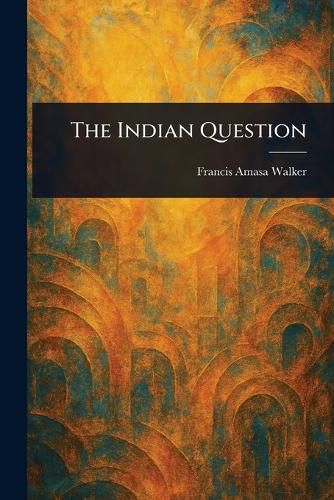Readings Newsletter
Become a Readings Member to make your shopping experience even easier.
Sign in or sign up for free!
You’re not far away from qualifying for FREE standard shipping within Australia
You’ve qualified for FREE standard shipping within Australia
The cart is loading…






This title is printed to order. This book may have been self-published. If so, we cannot guarantee the quality of the content. In the main most books will have gone through the editing process however some may not. We therefore suggest that you be aware of this before ordering this book. If in doubt check either the author or publisher’s details as we are unable to accept any returns unless they are faulty. Please contact us if you have any questions.
"The Indian Question (1874)" by Francis A. Walker offers a crucial historical perspective on United States government policy and Indian affairs in the 19th century. Walker, a prominent voice on the subject, delves into the legal status and laws affecting Native Americans during a period of significant upheaval and change. This meticulously prepared print edition presents a vital examination of the complex issues surrounding the treatment of Native Americans and their relationship with the expanding nation. Explore the historical context of indigenous legal systems and the challenges faced by Native American communities as they navigated evolving government policies. This book remains an essential resource for understanding a pivotal era in American history and the ongoing discourse surrounding indigenous studies.
This work has been selected by scholars as being culturally important, and is part of the knowledge base of civilization as we know it.
This work is in the public domain in the United States of America, and possibly other nations. Within the United States, you may freely copy and distribute this work, as no entity (individual or corporate) has a copyright on the body of the work.
Scholars believe, and we concur, that this work is important enough to be preserved, reproduced, and made generally available to the public. We appreciate your support of the preservation process, and thank you for being an important part of keeping this knowledge alive and relevant.
$9.00 standard shipping within Australia
FREE standard shipping within Australia for orders over $100.00
Express & International shipping calculated at checkout
This title is printed to order. This book may have been self-published. If so, we cannot guarantee the quality of the content. In the main most books will have gone through the editing process however some may not. We therefore suggest that you be aware of this before ordering this book. If in doubt check either the author or publisher’s details as we are unable to accept any returns unless they are faulty. Please contact us if you have any questions.
"The Indian Question (1874)" by Francis A. Walker offers a crucial historical perspective on United States government policy and Indian affairs in the 19th century. Walker, a prominent voice on the subject, delves into the legal status and laws affecting Native Americans during a period of significant upheaval and change. This meticulously prepared print edition presents a vital examination of the complex issues surrounding the treatment of Native Americans and their relationship with the expanding nation. Explore the historical context of indigenous legal systems and the challenges faced by Native American communities as they navigated evolving government policies. This book remains an essential resource for understanding a pivotal era in American history and the ongoing discourse surrounding indigenous studies.
This work has been selected by scholars as being culturally important, and is part of the knowledge base of civilization as we know it.
This work is in the public domain in the United States of America, and possibly other nations. Within the United States, you may freely copy and distribute this work, as no entity (individual or corporate) has a copyright on the body of the work.
Scholars believe, and we concur, that this work is important enough to be preserved, reproduced, and made generally available to the public. We appreciate your support of the preservation process, and thank you for being an important part of keeping this knowledge alive and relevant.